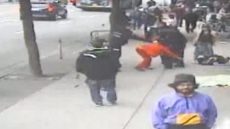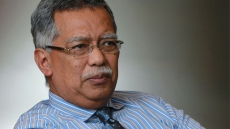TORONTO - Conrad Black will be allowed the right to speak in his own defence before Canada's largest provincial securities commission.
The Ontario Securities Commission will also allow testimony from two witnesses proposed by the former media mogul, including his former secretary.
But the OSC cautions that it doesn't want to revisit issues that have already been through the U.S. legal system.
The OSC alleges that Black was involved in a "scheme" with other directors and officers of Hollinger Inc. and Hollinger International to use non-competition payments to line their pockets with funds that should have gone to the companies.
On Monday, a lawyer for Black argued that the former newspaper baron should be allowed to testify before the quasi-judicial OSC because he poses no threat to capital markets and therefore shouldn't be banned by the Ontario Securities Commission from trading securities or becoming a director of public companies.
His lawyer also wanted to call several other witnesses, including Black's former secretary as well as directors and lawyers of the former Hollinger.
If Black loses his case before the OSC, he could face monetary and non-monetary penalties and be forced to repay the expenses of the OSC hearings.
Black had sought to have the proceedings dismissed and argued that a temporary order, which has been in place for years, already bars him from being a registrant or a director or officer of a reporting issuer in Ontario.
The temporary order will continue to be in effect until Black makes a request to have it lifted, or the commission decides to remove the restrictions.
The OSC case against Black began in 2005, but was adjourned while he faced criminal charges in the United States.
Of the many charges levelled against him by the U.S. Justice Department, Black was eventually only convicted of one count of fraud and one count of obstruction of justice.
He served 37 months of a 42-month sentence in a Florida prison, and was fined US$125,000.
The OSC hearings also include allegations against John Boultbee, a Hollinger executive was found guilty of three counts of fraud by a U.S. jury in 2007.
Boultbee had argued that his case should be heard separately from Black's hearing because he can't afford the expenses of travelling from British Columbia to be involved in a hearing that is mainly focused on Black. The hearing panel denied Boultbee's request on Wednesday.
The OSC and Black's former business partners, David Radler and Peter Atkinson, reached separate plea agreements with the regulator in 2012 and 2013. Ahead of Black's trial, Radler had pleaded guilty to one count of mail fraud at U.S District Court, and was sentenced to 29 months in jail and ordered to pay a fine of $250,000. He also had to testify against his former colleagues.





